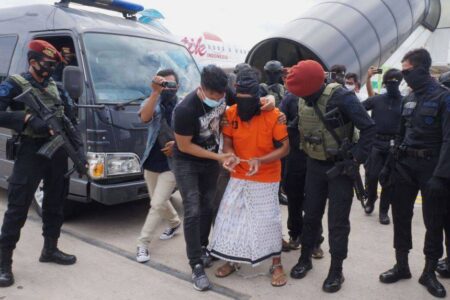
Indonesia uncovers training site for Jemaah Islamiyah terrorist network in Central Java
A two-storey house in Central Java used by the Jemaah Islamiah (JI) terrorist network to train recruits in handling weapons and assembling bombs for seven years until 2018 has been uncovered by Indonesian authorities.
Recruits at the fenced-in villa in Gintungan village in Semarang regency were inducted by senior militant Joko Priyono, alias Karso, under the instructions of Para Wijayanto, the leader of JI, the group behind the Bali bombings in 2002 that killed 202 people.
Both Karso and Para are currently behind bars after being convicted of terrorist activities.
At least 96 young militants underwent six-month training at the Gintungan house, with many of them sent to Syria to fight alongside terror group Jabhat al-Nusra, or Al Nusra Front.
The group was known as an al-Qaeda offshoot behind decapitations and murders in Syria and Lebanon.
The discovery of the house and its dark history between 2011 and 2018 was made by Indonesia’s anti-terrorism squad, Densus 88, amid ongoing operations against terrorists since the shocking Bali bombings.
Densus 88 intensified its efforts against terrorism recently after an attack that killed four members of a Christian family in a remote village in Central Sulawesi in late November.
That same month, a key plotter in the Bali bombings, Taufik Bulaga, alias Upik Lawanga, was arrested by the police.
And earlier this month, another man involved in the bombings as well as the suicide bombing at Jakarta’s Marriott Hotel that killed 12 people in 2003, Aris Sumarsono, also known as Zulkarnaen, was also arrested.
National Police spokesman Inspector General Argo Yuwono said on Monday (Dec 28) that the Gintungan house was one of 12 terrorist training sites discovered by Densus 88 across Central Java province.
“Eight trainers were recruited (by Karso) to train students from his network of Islamic boarding schools,” Insp-Gen Argo told reporters.
The privately owned villa is currently empty and under renovation, according to local media reports.
Para was sentenced by a Jakarta court to seven years’ jail in July this year for his role in recruiting, training and raising funds for Indonesian militants going to Syria.
Karso was arrested in 2019 and is serving a nearly four-year jail sentence.
Insp-Gen Argo said that of the 96 recruits, 66 made their way into Syria while the rest were arrested by Indonesian police.
“In Syria, they were trained to deploy firearms — rifles and guns — to assemble bombs. They were trained before joining the real war there,” he said.
He noted that a number of those arriving in Syria died there, while others who returned to Indonesia were arrested and jailed, came under investigation or are still being hunted by the police.
Based on Karso’s testimony, the training cost 65 million rupiah (US$4,580) a month for accommodation, trainers’ fees and medication.
It cost 300 million rupiah to send a batch of 10 to 12 trainees to Syria.
The funds were sourced from charity funds or collected from the network’s 6,000 active members, according to the police.
The authorities say that the JI network has renewed its sources of funding today by collecting cash from oil palm plantations, shifting from illegal activities in the past such as robbery and cyber crime.
Source: The Star





